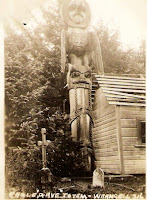Medicine Bag
 |
I stood at
the airport waiting for the plane to land. Beside me a young girl played a
traditional deer skin drum. Along with a few friends we sang the Tlingit song, Tsu Héidei Shugaxtutaan: Together we will open the container of wisdom.” Behind us the
crew and members from the US Coast Guard Maple and Air Station Sitka stood in
uniform waiting for the man’s arrival.
Tsu
héidi shugaxtootáan yá yaakoosgé dakeit haa jeex' a nák has
kawdik'éet'.— Kichnáalx.
We will open again this container of wisdom left in our care.—George Davis
On the
plane, a man in a camouflage uniform sat in a window seat watching the treetops
for bald eagles. The jet landed and the flight attendant welcomed the officer
over the intercom and thanked him for serving the country.
The
passengers disembarked and the man walked slowly down the jetway carrying a
large green duffle bag. He’d just returned from the Middle East after having
been deployed for seven months. In the small terminal, he looked around
apprehensively. He just wanted to come home and pet his dogs and hug his
grandkids, and hug me. He didn’t want a big deal made out of his homecoming.
But it was a big deal since he’s my husband.
Sure, I
worried about my husband when he was deployed with his unit, but he had his
medicine bag, one that he wore around his neck. Years ago I made my husband a
medicine bag when he graduated as a Physician Assistant. A medicine bag is
basically a sacred pouch, often a small pouch that’s only a few inches square. You
wear it like a necklace.

The medicine
bag is typically used by a healer, a shaman. In my culture it’s a noide, which is a traditional healer,
storyteller. In my husband’s case, he’s a healer. He’s adopted into a Tlingit
clan: Wooshkeetaan Tóoś Déx′i Hit, Eagle/Shark Backbone House of Hoonah. My
husband often incorporates traditional medicines with modern methods of
healing. Fish head soup works for the flu and devil’s club salve helps heal
open sores.
Funny,
though, I don’t know what’s in my husband’s medicine bag. If you have one, no
one is supposed to know what you put in it. Some people include an heirloom
that means something to them, or a piece of a dried medicinal plant or a small
token of some kind. Whatever it is, it’s usually important and has a spiritual
or social significance. In the past, as well as today, medicine bags are used
in healing ceremonies.
I imagined
that my Coast Guardsman husband might carry a poem in his medicine bag too. Like
me, my husband is also a poet. While he was gone to war I wrote a couple of
short stories and a few poems about him and the Iraq war. Some were about what
my husband might be going through. Some were about what I was going through. In
one poem I imagined what was in his medicine bag and how it could keep him
safe. It had spiritual powers.
When I think
about it, a medicine bag is a good metaphor for inspiration. It’s a container
of wisdom. If you had a medicine bag what would be in it? Would it give you strength? Would it protect you or give you courage? Would it be a reminder
of past times, a grandmother or mentor who’s long dead. Perhaps a lock of a
child’s hair? A poem? A special coin?
Whatever is
in your medicine bag, don’t tell me.--Keep to yourself. But think about the
medicine bag as metaphor. It can be a thing of inspiration, healing, and power.
It is good medicine.
Yes, the
best medicine might be a small pouch of hidden things designed for power and
protection. Sometimes, though, the best medicine is remembrance. Memorial Day
is a day of remembrance for those who’ve died in our nation’s service. It’s
also a time to remember those who’ve served or are serving in the military,
people like my husband. My father-in-law served on the aircraft carrier USS
Franklin. My children’s aunt served in the Navy and her husband disappeared on
a Navy submarine never to be heard from again. My grandfather served as a raid
warden in our small Alaskan community. Many friends and neighbors have served in the military.
On Memorial
Day, we lay wreathes on tombstones, we walk in parades, we have BBQs and picnics.
I usually take a quiet walk with my husband; a small but meaningful thing to
do.
* *
*
We walk on a
nettled trampled path in Totem Park. I hold my husband’s hand. We point out
bald eagles and note the incoming tide. We talk about stories, and poetry, and
little things that make us a couple. I squeeze his hand tight and thank god
and the spirits that he came home safe. What kept him safe when he was
deployed with his unit? Was it something he folded inside his medicine bag? I
don’t know, but what I do know is that I still wonder what’s inside his medicine bag.
*Previously published on my Young Adult/Middle Grade blog Pocketful of Charms.




Comments